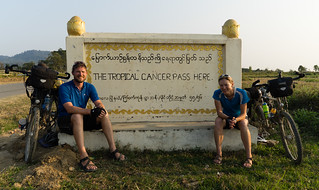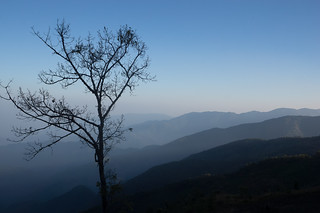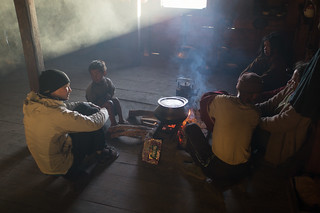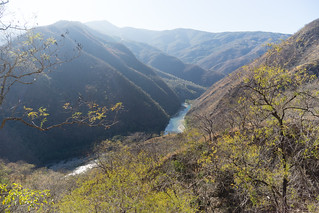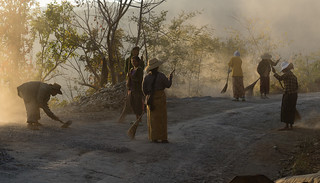We arrived in Moreh, the border town between Manipur and Myanmar, around lunchtime. Our permits just had arrived by email, so we found a place to print them out (even though we had been assured that a copy had also been sent to the border post). Then we ate lunch at a typical ‘rice hotel’ – a common name for lunch spots in Northeast India – where we were approached by a man with a thermometer who told us we had to have our temperatures taken to ensure that we didn’t have ebola. They wouldn’t let us into Myanmar otherwise, he said. So we got our temperature taken and received a certificate indicating that we were healthy, and then proceeded to the border.
We had a little trouble finding the Indian checkpoint – it was a much bigger building than at the border with Nepal, but it wasn’t clearly marked and there were no other travelers there. Once we found it, we had to track down some officials, who, after digging up an ink pad and some stamps – apparently not a lot of foreigners cross here – checked us out of the country. We then rode through a no-man’s-land of burning garbage piles before crossing a bridge and seeing the sign reading “India-Myanmar Friendship Highway.” After all of the planning, reaching the Myanmar border felt particularly momentous. We parked our bikes on the street next to a steep staircase leading to the customs building. This was it – the moment of truth. Would they let us in? A bored-looking man in a blue lungyi (sarong) told us to sit, then fetched the permits that the travel agency, Seven Diamond, had sent to him. It all seemed fairly routine, like they let foreigners cross every day, which felt contrary to our experience getting out of India, just across the river. We began to suspect that the permit wasn’t even necessary and it was all a racket to squeeze extra money out of tourists. He stamped our passports and wrote in the 30 days we were allowed to stay. Nobody had appeared to collect our money and we thought we might be able to just leave, but he told us to wait for our ‘guide.’
Eventually a young man with a mouth stained red from betel nut appeared on a motorbike, and we were released into his care. He didn’t ask for money, just motioned for us to follow him, so we did. We rode a few kilometers to the border town of Tamu, where he said he’d show us to our guesthouse. We weren’t expecting this, and we asked if we had to stay there. He told us we were free to stay anywhere we wanted, but first asked for the $200 we owed him for the permits. We handed it over (two crisp $100 bills saved for this very purpose) and rode around the town, which consisted of a few blocks on each side of a T-section. With some difficulty we accomplished our tasks: changing rupees (we were told to look in the market but nobody there could help; instead we found an Indian man at a clothing shop called Mizo, on the main road about half a kilometer past the turnoff to the market) and getting a SIM card (there were lots of places selling them in the market, but we never could get the data to work!). We looked for a cheaper guesthouse, but only saw one hotel that looked so unpromising we didn’t even check. We went back to the first place, had dinner at a “beer station” (after months in countries where alcohol was hard to find, and rarely available at restaurants, we decided we were going to like Myanmar), and turned in.
The next day we biked towards Kale, about 90 miles away. Myanmar uses both miles and kilometers (as well as furlongs, which refer to the length of a furrow in an agricultural field, and are 1/8 of a mile), and sometimes people use the terms interchangeably to refer to the same distance. This caused us a few navigational problems during our time in the country. We took a long lunch break, enjoying the leisurely feeling of this very relaxed country, and we didn’t make it to Kale that day. Near sunset, we went through a village and stopped to watch some guys playing chinlone, a local sport similar to volleyball in which small teams use their feet, heads, torsos – anything but their hands – to get a small rattan ball over a net. We made sleeping motions and gestured around, but people just pointed us down the road. We asked at several more places, following their outstretched hands; the place they pointed us to may have been an official’s house, but the people inside just stared at us. We had already gotten water, so we figured we’d test our luck and camp.
Almost every cyclist’s blog in Myanmar has stories of being discovered by the police and forced out of their campsites, so we knew we’d have to be stealthy. The area was pretty heavily populated, though, and all of the paths off the road led to fields and houses. Finally we decided to just strike out through an empty field, not following a path. We raced off the road when there were no cars coming by and crashed through the bushes; after a while we found ourselves in a harvested rice paddy with a couple of buffalo staked nearby, well hidden from the road. We pitched our tent and made dinner by the light of the full moon – we’d read on another couple’s blog that they never used flashlights when camping to avoid detection – enjoying the chirping crickets and comfortable site.
The next day we made it to Kale in the early afternoon. We met Guillome, a French Canadian traveler who had spent about a month in Myanmar. He’d been having a great time, taking boats and buses through Shan state and in the far south after crossing over from Thailand. He taught us that a hand waved vertically by your ear means ‘no.’ We had lunch (with beers) and dinner (with more beers) at a Chinese restaurant down the street from our hotel, where we were excited to speak Mandarin with the owners.
We left early the next morning and biked out of town, immediately beginning our climb into Chin State. The guidebook said some of the state was recently opened to foreigners, with the rest, presumably, still being closed. Seven Diamond, the agency that had arranged our border crossing permit, said that the capital, Hakha, which was about a third of the way down our intended route, was open, but that the other two towns we’d asked about farther down the road required a permit and guide. We figured we’d just go as far as we could and see what happened.
We climbed 2000 meters that day on a good paved road. Near sunset a young man on a motorbike passed us and asked, in his limited English, the usual questions – Where are you going? Where are you from? How do you like our country? – and invited us to stay at his house. We were thrilled, since the steep terrain meant camping would be difficult, but then he said his village was seven miles away. We were still going up, and we wouldn’t be able to make it by dark. So we promised to come to his house for breakfast the next morning, and, in the next village we encountered, asked at a church for a place to stay. David had barely mimed the sleeping motion and the old man was waving him in, pointing to a mostly-empty room.
We were a little wary of staying with villagers – we’d heard it’s illegal and that, while we probably wouldn’t get in trouble, local people who hosted us might. Since it was nearly impossible to camp, we thought a church might be a good bet as a last resort, since it wasn’t anybody’s home. Well, this church turned out to be attached to a home, and the family that lived there (presumably the pastor’s family) invited us to eat with them and later treated us to a sing-along concert that was crazy magical. Dinner was rice and some sort of green vegetable, cooked over a wood fire in the middle of the room. No chimney meant a smoky room, and the dim, battery-powered light coupled with the cooking fire and smoke and total lack of shared language made for a shadowy, quiet, sacred-feeling meal. This was the poorest family we stayed with on the whole trip, I think, and we tried to explain that we had our own food and didn’t need to eat theirs, but they weren’t having it. We then tried to share a plate of rice and not take much of the vegetables, as we’d had a good lunch, but again, no dice – they kept piling food on our plate and urging us to eat, and eventually, we complied.
The family consisted of an older couple, their son and daughter-in-law, and their three children, a teenage girl and two little boys, four and five years old. We ate in shifts around a low wooden table, sitting on tiny wooden benches a few inches off the ground. The girl ate last and alone, and as she did she occasionally burst into wild-sounding guffaws. Later I heard the same noise a few times in the middle of the night. She kept to herself, staring intently at nothing and not talking to anybody, and I think she must have had some sort of mental illness that affected her communication and behavior. The two boys were always by the side of their mother or grandmother, and the youngest, once he got used to us, kept sneaking big grinning glances at me. After the singing, they laid out a mat and a few blankets for us on the floor of the church room, then went to bed in a room next to the kitchen. In the morning they served us mugs of a hot cereal, and after efforts to convey our gratitude that could only fall short, we were on our way.
As we rode, we asked for the village of the young man from the night before, but we never found it. I do think I saw him though, out of the corner of my eye as we were descending, but it didn’t register until much later and I felt badly that we hadn’t stopped. However, later that morning we made another friend and went to church. After about ten kilometers we stopped in a village and tried to find a restaurant to supplement the cereal we’d eaten. A young woman who spoke good English took us to the only restaurant in town, but it was time for church and the owners didn’t have time to make breakfast for us. So the woman invited us to her house and made us scrambled eggs served with rice. We got out our coffee and had a nice breakfast. She’d learned English working as a maid in Malaysia, apparently a common things for girls in the area to do. She told us that some people are so poor that they don’t have enough food, so they send their daughters abroad to work. This unfortunately is often what happens when people get caught by traffickers and sold into an altogether different line of work.
This young woman had gone with an agent when she was 14 and worked for four years. Now she’d been back for a while – she was 23 – and was married with a 6-month-old son. She went to a different church than the restaurant owners, and we asked if we could attend the service. It had been years since I’d been to church, and I think the majority of my attendance as an adult has been outside of the US, meaning I rarely understand the services. Here, it didn’t matter. The Chin Baptist church just about converted me back to Christianity. Like the singing the night before, it defies description. We were both in a strange mental space – I’d gotten angry with David for not trying harder to find the motorbike man, and I think we were also just worn out from the road. I think our nerves were truly raw. Everything touched us, one way or another, and I was never far from tears those first few days in Chin State. Whether it was mystical chanting in a smoky room, our own attempts to sing Amazing Grace (at our hosts’ request – they were not impressed), the voices of a youth choir filling every corner of the chapel, a failure to keep a casual promise, or the beautiful contour of the road around the mountains, it just got to me.
After church we started riding again, up and up, and found a place to camp between bends in the road where the land had been cleared, probably for firewood to heat the tar used for road repairs. There was a lot of roadwork going on in Chin State – repairing the dirt roads from the landslides that must happen every rainy season, and widening and paving some stretches – with mixed-gender crews and entire families living in camps along the road. We were awoken before light by somebody firing up the tar fires, but he probably didn’t see us and we went back to sleep. The road crew arrived just as we were packing up, and when we started carrying our stuff up the sleep slope to the road, one of the men spotted us and rushed down to help us. The women all giggled at us from under their straw hats, no doubt wondering what on earth we were doing there, and we felt like the day had gotten off to a nice start.
We thought we might make it to Hakha that day, but people kept saying it was 20, then 15, then 13 miles away – too far to make it before dark. So we found a nice place to camp, but we hadn’t filled up our water bladder since we’d hoped to make it to town. We decided to use our water to make noodles for dinner and have breakfast in town; we were not happy campers the next morning. Still, the campsite was great – set well back from the road with a nice view of the surrounding valleys. We heard lots of gunshots from local hunters, and later we heard yipping and howling that was probably the local version of coyotes but sounded like tormented ghosts to me.
The ‘miles’ people had told us about turned out to be kilometers, and as we rolled into town early the next morning, we were frustrated to realize that we could have made it to Hakha the night before after all. A very kind hotel manager let us nap and shower in one of his rooms for free, and we also did some laundry. First, though, we ate a giant breakfast, and later a big lunch. It was getting later and later, and as we rode out of town around 4:00 David decided he needed to check email to set up some book events, try to arrange a talk in Yangon, and let our parents know we were alive. Of course the Internet place was down hill in the wrong direction, and by the time we finished it felt stupid to leave. So we ended up spending the night and had dinner with visiting World Vision workers, including an American who told us who had won the Super Bowl, days afterwards. David was thrilled; I wished we could have avoided hearing the news…







